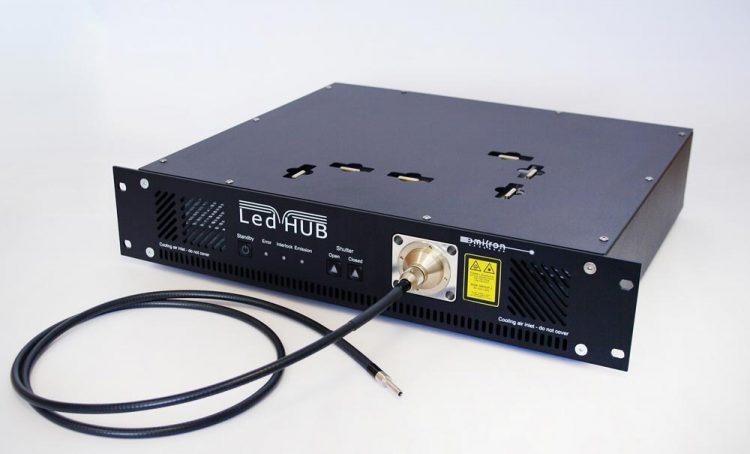Innovative LED High Power Light Source for UV

"LedHUB LED Engine" from Omicron now available with 340nm
Omicron‘s innovative „LedHUB LED Light Engine“ represents a new form of LED light source for science and research. The high-performance system can be equipped with one to six LED modules of many different wavelengths between 340nm in the UV up to 940nm in the near IR and offers fast analogue intensity modulation with up to 200KHz and digital modulation with a switching time of <2µs for each channel. The individual LED modules can easily be exchanged and added by the user. Hence the system can be adapted to individual application requirements and is future-proof.
With a direct and active temperature control of the LED chips it is possible to keep the power level and the emission spectra of the LED chips stable. This feature guarantees reliable and repeatable results in the customer‘s applications.
The light of the various high power LEDs is combined within the “LedHUB” by special optics and can be coupled efficiently into quartz glass fibres or liquid light guides.
LEDs with up to 5.000 milliwatt of optical output power can be used in the “LedHUB” systems. Through directly accessible filter holders, that can be equipped with 25mm standard filters, the emission of each single LED may additionally be adapted to the application. The modulation is possible via external modulation signals as well as by an internal programmable signal generator. A SYNC in- and output ensures the synchronization of / from external devices like cameras, microscopes or DAC cards.
Especially for microscopic applications like Calcium imaging with FURA-2 fluorophores, that require rapid toggling at 340nm and 385nm, the LedHUB is an ideal alternative to lamp based Monochromators or sources with slow filter wheels.
The device can be conveniently controlled via the integrated RS-232 and USB-2.0 interface, the included software „Omicron Control Center“ or third party software. Typical applications include microscopy, fluorescence analysis and the use as multispectral light source in forensics.
The “LedHUB LED light engines” are offered with a manufacturer's warranty of three years.
Omicron will present its latest products during „Laser World of Photonics 2017“ exhibition in Munich from June 26th to 29th, 2017.
Further information on Omicron laser products can be found at www.omicron-laser.de
About Omicron
Since 1989, Omicron has been developing, building and producing innovative laser systems. With a highly qualified team Omicron specialized in customized solutions for applications in the fields of medicine, research, biotechnology, such as microscopy and flow cytometry, digital imaging and optical data storage as well as quality assurance and measurement engineering. Product development and production comply with European and US guidelines. A broad band of laser sources in the range of UV VIS/IR is available to satisfy individual customer requirements. Omicron offers single light sources as well as complete system solutions. Omicron pursues the objective of being an industry leader in product development and has not only set trends in laser technology but also has drawn worldwide attention with its developments.
Omicron-Laserage Laserprodukte GmbH
Raiffeisenstrasse 5e
63110 Rodgau-Dudenhofen
Germany
Tel: +49-(0)6106-8224-0
Fax: +49-(0)6106-8224-10
email: mail@omicron-laser.de
Media Contact
All latest news from the category: Physics and Astronomy
This area deals with the fundamental laws and building blocks of nature and how they interact, the properties and the behavior of matter, and research into space and time and their structures.
innovations-report provides in-depth reports and articles on subjects such as astrophysics, laser technologies, nuclear, quantum, particle and solid-state physics, nanotechnologies, planetary research and findings (Mars, Venus) and developments related to the Hubble Telescope.
Newest articles

A universal framework for spatial biology
SpatialData is a freely accessible tool to unify and integrate data from different omics technologies accounting for spatial information, which can provide holistic insights into health and disease. Biological processes…

How complex biological processes arise
A $20 million grant from the U.S. National Science Foundation (NSF) will support the establishment and operation of the National Synthesis Center for Emergence in the Molecular and Cellular Sciences (NCEMS) at…

Airborne single-photon lidar system achieves high-resolution 3D imaging
Compact, low-power system opens doors for photon-efficient drone and satellite-based environmental monitoring and mapping. Researchers have developed a compact and lightweight single-photon airborne lidar system that can acquire high-resolution 3D…





















